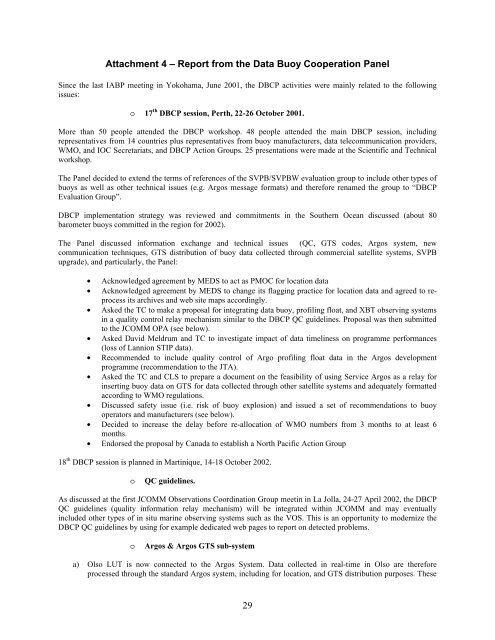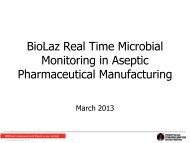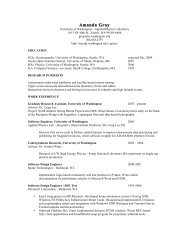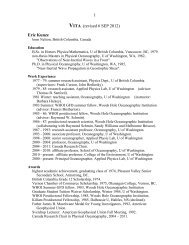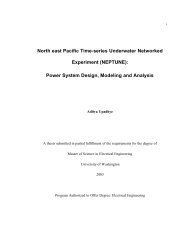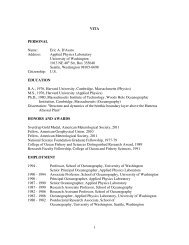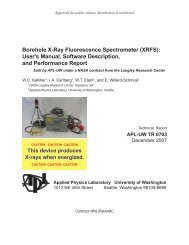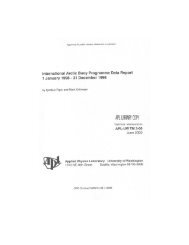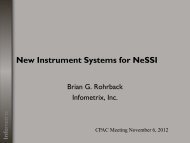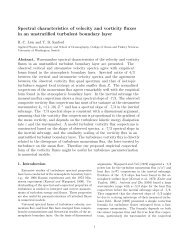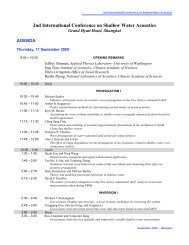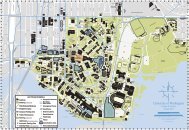International Arctic Buoy Programme (IABP) Marine Environmental ...
International Arctic Buoy Programme (IABP) Marine Environmental ...
International Arctic Buoy Programme (IABP) Marine Environmental ...
Create successful ePaper yourself
Turn your PDF publications into a flip-book with our unique Google optimized e-Paper software.
Attachment 4 – Report from the Data <strong>Buoy</strong> Cooperation PanelSince the last <strong>IABP</strong> meeting in Yokohama, June 2001, the DBCP activities were mainly related to the followingissues:o 17 th DBCP session, Perth, 22-26 October 2001.More than 50 people attended the DBCP workshop. 48 people attended the main DBCP session, includingrepresentatives from 14 countries plus representatives from buoy manufacturers, data telecommunication providers,WMO, and IOC Secretariats, and DBCP Action Groups. 25 presentations were made at the Scientific and Technicalworkshop.The Panel decided to extend the terms of references of the SVPB/SVPBW evaluation group to include other types ofbuoys as well as other technical issues (e.g. Argos message formats) and therefore renamed the group to “DBCPEvaluation Group”.DBCP implementation strategy was reviewed and commitments in the Southern Ocean discussed (about 80barometer buoys committed in the region for 2002).The Panel discussed information exchange and technical issues (QC, GTS codes, Argos system, newcommunication techniques, GTS distribution of buoy data collected through commercial satellite systems, SVPBupgrade), and particularly, the Panel:• Acknowledged agreement by MEDS to act as PMOC for location data• Acknowledged agreement by MEDS to change its flagging practice for location data and agreed to reprocessits archives and web site maps accordingly.• Asked the TC to make a proposal for integrating data buoy, profiling float, and XBT observing systemsin a quality control relay mechanism similar to the DBCP QC guidelines. Proposal was then submittedto the JCOMM OPA (see below).• Asked David Meldrum and TC to investigate impact of data timeliness on programme performances(loss of Lannion STIP data).• Recommended to include quality control of Argo profiling float data in the Argos developmentprogramme (recommendation to the JTA).• Asked the TC and CLS to prepare a document on the feasibility of using Service Argos as a relay forinserting buoy data on GTS for data collected through other satellite systems and adequately formattedaccording to WMO regulations.• Discussed safety issue (i.e. risk of buoy explosion) and issued a set of recommendations to buoyoperators and manufacturers (see below).• Decided to increase the delay before re-allocation of WMO numbers from 3 months to at least 6months.• Endorsed the proposal by Canada to establish a North Pacific Action Group18 th DBCP session is planned in Martinique, 14-18 October 2002.o QC guidelines.As discussed at the first JCOMM Observations Coordination Group meetin in La Jolla, 24-27 April 2002, the DBCPQC guidelines (quality information relay mechanism) will be integrated within JCOMM and may eventuallyincluded other types of in situ marine observing systems such as the VOS. This is an opportunity to modernize theDBCP QC guidelines by using for example dedicated web pages to report on detected problems.o Argos & Argos GTS sub-systema) Olso LUT is now connected to the Argos System. Data collected in real-time in Olso are thereforeprocessed through the standard Argos system, including for location, and GTS distribution purposes. These29


